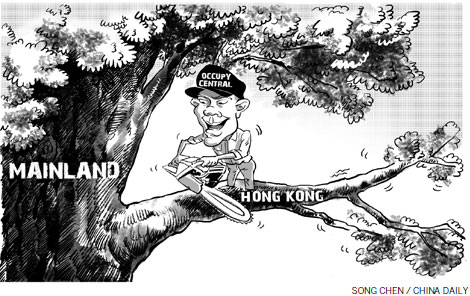Hong Kong at the crossroads

Hundreds of thousands of Hongkongers voted online, via smartphones and polling booths in a ten-day unofficial referendum that ended on Sunday. It was deemed illegal by the central government.
However, the vote was designed, conducted and concluded in a way that has raised questions about its political goals. The "Occupy Central" protest group offered voters three choices in support of electing the chief executive by popular vote, but none against. Also, external observers were not used. Furthermore, instead of 10 days, most parliamentary democracies use a single election day.
In practice, the number of voters in the "democracy poll" represented one-tenth of Hong Kong's population of seven million, and a fifth of registered voters.
Economic integration is measured by flows of trade, investment, and people. Today, the mainland is Hong Kong's largest export partner and its largest import partner. And more than 75 percent of the inflows of foreign direct investment can be traced directly to the mainland or to Chinese companies incorporated abroad.
In 2013, Hong Kong received a whopping 55 million visitors, including 26 million tourists, of these, 75 percent of all visitors and 67 percent of all tourists were from the mainland.
As incomes have risen in the mainland, the number of the mainland tourists visiting Hong Kong has soared, which has led to complaints. And yet, mainland tourism also makes a huge contribution to Hong Kong's economy. In fact, it stems from the 2003 Individual Visit Scheme, which the central government launched to support Hong Kong after its economy had been hit by the outbreak of SARS.
The political forces that would prefer the mainland to play little or no role in Hong Kong ignore the realities that, without the mainland, it would be left with only half of its trade, one-fourth of its foreign investment and visitors, not to mention only one-tenth of its water and food supply.
A small minority in Hong Kong may consider such a path politically desirable. But most see it as an economic nightmare.
In early 2013, pro-democracy forces in Hong Kong participated in protest marches with many demonstrators carrying the former British colonial flag of Hong Kong. Some of the misguided colonialist nostalgia has been accompanied by anti-mainlander discrimination, even virulent bullying.
The political irony is overwhelming. When Hong Kong was under British administration from 1841 to 1997, the UK did not promote democracy. That only began just before and especially after the reunification.
The difference in average living standards is even more poignant. From the launch of reform and opening-up to the reunification, Hong Kong's living standards quadrupled. In 1980, they were 40 percent below those in the UK; in 1997, 15 percent higher.
This growth was not automatic. Amidst the handover, the Asian financial crisis caused property prices to plunge in Hong Kong. But by early 1998, then premier Zhu Rongji promised the central government would protect Hong Kong "at all costs". And as the central government bought stocks and futures, the speculative attacks were rebuffed.
Until the global crisis of 2008/9 Hong Kong's growth record remained fairly strong, thanks to the peaceful post-handover transition which ensured stability, China's membership in the World Trade Organization in 2001, which energized trade and investment, and Hong Kong's strengths as a financial intermediary for Chinese companies and investors.
By 2013, Hong Kong's per capita income was one of the highest in the world, over $52,700, 30 percent higher than in the UK.
Without the mainland, living standards in Hong Kong would be far lower.
Hong Kong's major business leaders believe their beloved city is losing its spirit. Among others, former Hong Kong banker Joseph Yam Chi-kwong has warned the city could lose its status as China's top financial center if political developments undermine past progress.
Meanwhile, Hong Kong's traditional assets - free trade, investment and finance - are spreading in the mainland through free trade zones, starting in Shanghai.
Further integration with Guangdong province could alleviate the challenges associated with Hong Kong's maturing economy and aging population. However, such a measure is often opposed by the same political interests that supported the referendum.
There is a huge discrepancy between Hong Kong's economic gains and its eroding social fabric. Today, its income inequality is worse than in Zimbabwe and Paraguay, as measured by the Gini Index, despite three decades of rapid catch-up growth, two decades of mainland reforms, and another decade of mainland's rapid trade, investment and financial development.
This polarization, however, is not the result of economic integration with the mainland, but inadequate social cohesion in Hong Kong.
What Hong Kong needs is steady political development, adequate social policies and further economic integration.
The author is research director of International Business at India China and America Institute (USA) and Visiting Fellow at Shanghai Institutes for International Studies (China) and the EU Center (Singapore).


















